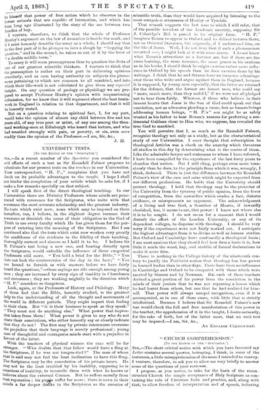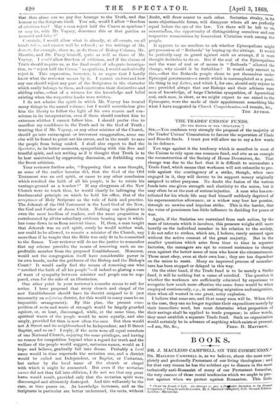" CHURCH COMPREHENSION."
(To THE EDITOR OF THE SPECTATOR:1
Sin,—The short critical notice with which you have favoured my Letter contains several queries, betraying, I think, in some of the instances, a little misapprehension of the sense I intended to convey. I venture, therefore, to ask you to allow me very briefly to answer some of the questions of your reviewer.
I propose, as you notice, to take for the basis of the reconstructed Church the simple acceptance of Holy Scripture as containing the rule of Christian faith and practice, and, along with that, to allow freedom of interpretation and of speech, believing that thus alone can we pay due homage to the Truth, and due honour to the Scripture itself. You ask, would I allow "freedom of criticism too ? May a man reject half the Canon as spurious ? or may he, with Mr. Voysey, denounce this or that portion as immoral and false ?"
0.rtainly, I would allow what is already, at all events, on all hands taken, and cannot well be refused ; as the writings of Mr.
Jowett, for example, show us, as do those of Bishop Colenso, Mr.
Maurice, and Dr. Pusey himself, quite as well as those of Mr. Voysey. I would allow freedom of criticism, and if the claims of Truth should require us, as the final result of adequate investiga tion, to "reject half the Canon" as spurious, I would undoubtedly reject it. This expression, however, is so vague that I hardly know what the reviewer means by it. I cannot understand how any one should reject any part of the Scriptures in the character which really belongs to them, and constitutes their distinctive and abiding value,—that of a witness for the knowledge and belief existing when the respective books were written.
I do not admire the spirit in which Mr. Voysey has treated many things in the sacred volume ; but I would nevertheless give him the liberty to follow the light of his own reason and con science in its interpretation, even if these should conduct him to extremes whither I cannot follow him. I should prefer thus to manifest my confidence in the Truth and in the God of Truth ; trusting that if Mr. Voysey, or any other minister of the Church, should go into extravagant or irreverent exaggeration, some one else will be found to point out his errors, and in the result to save the people from being misled. I shall also expect to find the Spectator, in its better moments, sympathizing with this free and trustful spirit, and not writing as if it thought that Truth is to be best maintained by suppressing discussion, or forbidding even the freest criticism.
Your reviewer further asks, "Supposing that a man thought, as some of the earlier heretics did, that the God of the Old Testament was an evil spirit, or came to any other conclusion which revolted the faith of all his people, is he to retain his vantage-ground as a teacher ?" If any clergyman of .the New Church were to teach thus, he would clearly be infringing the fundamental principle on which he held his office, that of the acceptance of Holy Scripture as the rule of faith and practice.
The Jehovah of the Old Testament is the Lord God of the New, the God and Father of Jesus Christ. Nothing can be plainer to even the most heedless of readers, and the same proposition is corroborated by all the subsidiary evidence bearing upon it which has come down to us from ancient times. If, then, a man taught that Jehovah was an evil spirit, surely he would neither wish, nor could lie be allowed, to remain a minister of the Church, any more than if he taught that the Bible was only fit to be committed to the flames. Your reviewer will do me the justice to remember that my scheme provides the means of removing such an un profitable member from the proposed Establishment. Moreover, would not the congregation itself have considerable power in its own bands, under the guidance of the Bishop and the Bishop's Court? It would easily find the means of removing one who "revolted the faith of all his people"—if indeed so glaring a case of want of sympathy between minister and people can be supposed, even for the sake of an illustration.
One other point in your reviewer's remarks seems to call for notice. I have proposed that every church and chapel of the new Establishment should have its district assigned to it (not necessarily an adjoining district, for this would in many cases be an impossible arrangement). By this plan, the present com petition of sects and waste of strength would be largely guarded against, or, at least, discouraged, while, at the same time, the spiritual wants of the people would be more equally, and also amply, provided for than is now often the case. But then would not A Street and its neighbourhood be Independent, and B Street Baptist, and so on ? I reply, if the sects were all equal members of one National Church, enjoying the same privileges, and having no reason for competition beyond what a regard for truth and the welfare of the people would suggest, sectarian names, would as I hope and believe, gradually fall into disuse. Probably a local name would in time supersede the sectarian one, and a district would be called not Independent, or Baptist, or Unitarian, but rather by the local name of the church or chapel with which it might be connected. But even if the sectarian names did not thus fall into oblivion, I do not see that any great harm would result, provided only that the sectarian spirit were discouraged and ultimately destroyed. And this will surely be the case, as time passes on. As knowledge increases, and as the Scriptures in particular are better understood, the sects, without
doubt, will draw nearer to each other. Sectarian rivalry, in its more objectionable forms, will disappear where all are perfectly equal before the eye of the law. Yet there will be left to us, nevertheless, the opportunity of distinguishing ourselves and our respective communions by benevolent Christian work among the people.
It appears to me needless to ask whether Episcopalians might get possession of "Bethesda" by buying up the sittings. It would be perfectly easy to guard against such an attempt, if it were thought desirable to do so. But if the zeal of the Episcopalians and the want of zeal or of means in " Bethesda " allowed the change, why should it be forbidden ? It would only amount to this,—that the Bethesda people chose to put themselves under Episcopal government—a result which is contemplated as a possible thing in my Letter, and which I, for one, should only rejoice to see; provided always that our Bishops and their advisers were men of knowledge, of large Christian sympathies, of Apostolical zeal, such men, in short, as we might expect to see raised to the Episcopate, were the mode of their appointment something like what I have suggested in Church Comprehension.—I remain, &c.,
THE AUTHOR.



































 Previous page
Previous page